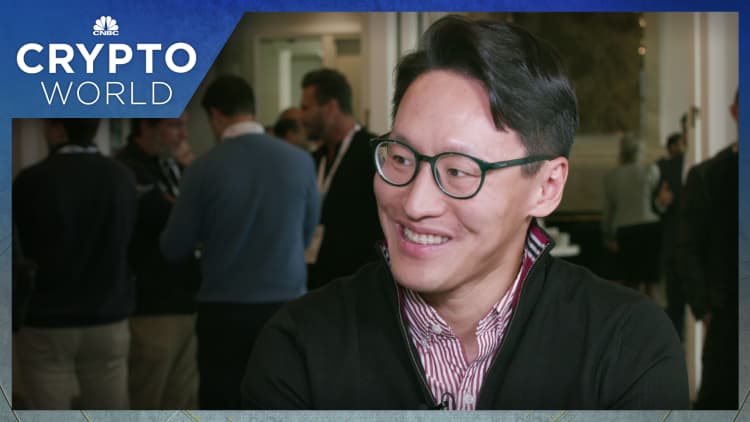Institutional interest in crypto is ‘maturing,’ says Cantor Fitzgerald’s Han

It may look and feel like crypto has lost its shine for institutional investors, but their interest is still there to stay and may even be maturing, according to Cantor Fitzgerald’s Elliot Han.
Han, who leads the firm’s crypto, blockchain and digital assets investment banking, told CNBC’s “Crypto World” that those who have remained in crypto are exploring its different use cases.
“There’s a lot of excitement in this space right now,” he said, speaking at Digital Assets Week, a conference in San Francisco geared to some of the biggest U.S. financial institutions. “There are a lot of companies here that are looking at it from many different perspectives and angles. That’s what we’re trying to learn and understand more, is what are these other use cases that aren’t necessarily obvious.”
It sounds like a preliminary step, but it’s a significant shift in thinking from when people piled into the crypto market in 2021 with hopes of earning a good return for riding out some of crypto’s infamous volatility.
“Back then it was more of a frenzy,” Han said. “There was all this crypto, blockchain hype and euphoria. And quite frankly, people weren’t looking at it from a use-case perspective, they were just looking at it [and asking] how can I make the most money?”
One of the biggest emerging topics for this corner of the market is the ability to “tokenize” real world assets like gold on a blockchain. Many at the event made the case that this would give institutions the ability to provide more information and data to clients about their investments.
This isn’t the first time the institutional world has gotten excited about blockchain while pushing bitcoin and cryptocurrency use cases to the back burner. In 2015 and 2016 almost every bank in the U.S. went through a test-and-learn phase with blockchain technology – private blockchains, not public ones like the Bitcoin network. This phase was more about the deployment of the technology within private banking systems.
Now, “we’re seeing a lot more maturity,” Han said, attributing it to regulation “slowly coming into place” and “more institutional players coming into the space.”
“Last time, there were a handful,” he explained. “Everyone kept talking about [how] ‘the institutions are coming, they’re coming’ – and then you wait a year, two, three, and you still haven’t seen them really come in droves. Now, have the floodgates open? No, I don’t think so. But I think you see a lot more that have come into the space. … You’re definitely seeing a lot more experimentation.”
Some of the experimentation is a gradual move forward for institutions, he said. A bigger move will take a lot of time, he said.
Most of the large banks like JPMorgan and Goldman Sachs that began experimenting seven years ago are still in the market, Han said. There also are more small investors like family offices and smaller venture capital funds coming into the market, too.
As for cryptocurrency itself, “the investment aspect of is still there,” but “the baseline is going to be tokenization.”
“Yes, make some sort of allocation, but do you bet the farm on it? I don’t think so,” Han said, warning that there’s still a high level of volatility, uncertainty and regulatory action left to be taken.”That’s going to really cause a lot of the institutional investors to be cautious about these investments.”
“But at the same time, a lot of the forward-thinking ones are still getting involved, dipping their toes in setting aside pockets of capital that makes sense,” he added. “They are looking to be involved and I think that’s going to continue to stay.”
For all the latest Technology News Click Here
For the latest news and updates, follow us on Google News.

